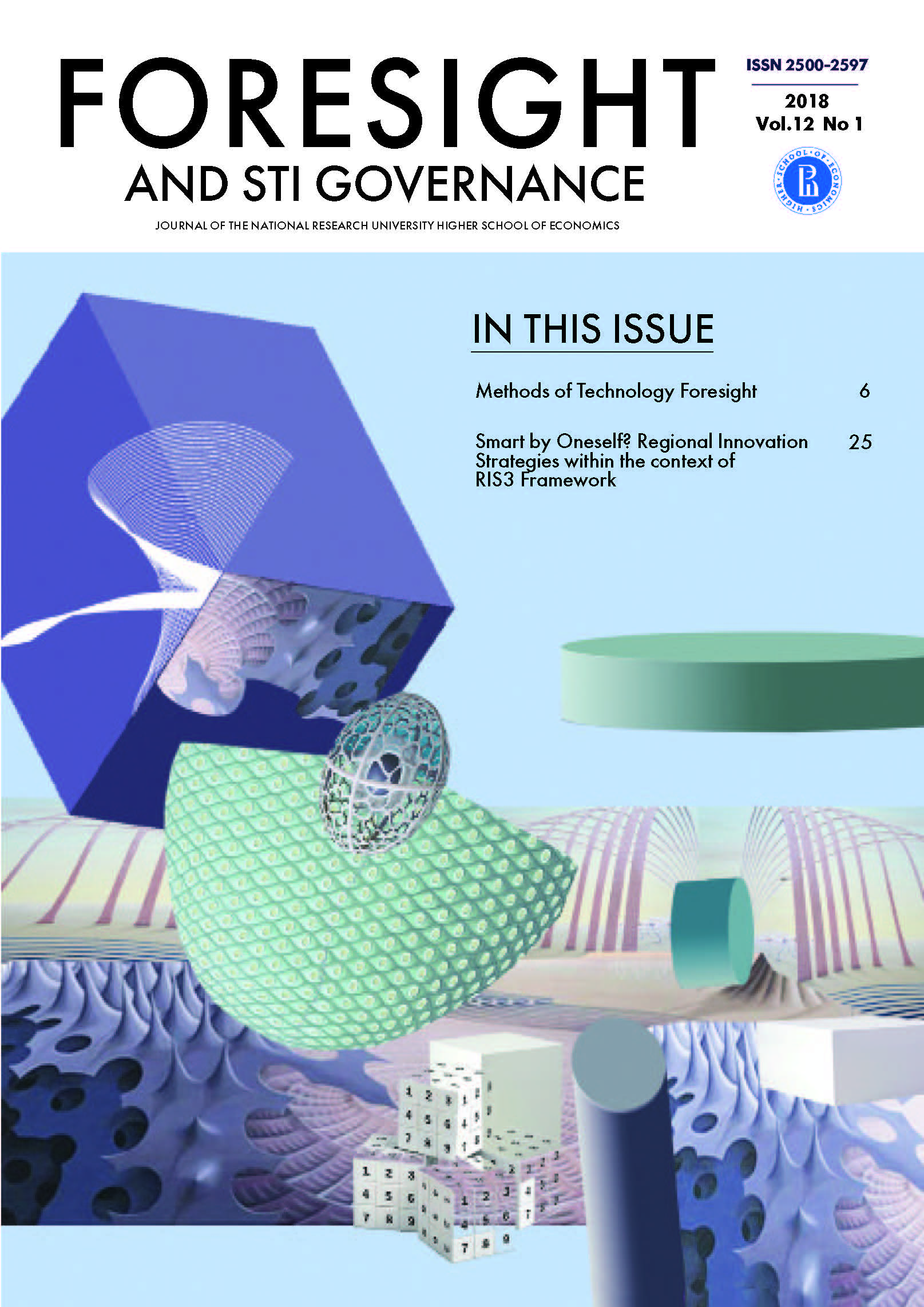Abstract
The paper investigates the social role of education and the relevance of university programs to the real needs of society, which has gained especial political importance in recent years. Attention to this topic, in turn, has fueled interest in the concept of the «knowledge triangle», which implies a synergistic effect from the interplay of education, research, and innovation. Existing studies on the interaction of higher education institutions (HEIs) with society and policy in this field are primarily focused on the links between science and innovation and on the contributions of HEIs to economic development and growth. Many researchers focus on the interaction between universities and the industrial sector but ignore HEIs’ involvement in creating innovations in the public services sector. This is rather peculiar, considering that innovation in the public sector has received increased policy attention over the recent period, and is seen as essential for improving the efficiency and quality of public services and for addressing some of the major societal challenges, linked, for example, to an ageing population and maintaining the welfare state.
This paper looks at the healthcare sector, where HEIs interact with private industry as well as public healthcare services. It builds upon a study from Norway carried out in 2015 in the framework of an OECD project, which mapped and analyzed knowledge triangle policies and practices at the national and institutional level. This study showed that interplay between education, research, and innovation is a key concern in the national policy for the development of the health sector, and that knowledge triangle interactions with both the private and public sector is a central aspect of the current practices at the medical departments at Norwegian HEIs. The linkages between the medical faculties and public healthcare services are especially interesting, as they provide patterns of interaction beyond those identified in the existing literature and because education plays a central role.
References
Amara N., Landry R., Halilem N. (2013) Faculty consulting in natural sciences and engineering: Between formal and informal knowledge transfer // Higher Education. Vol. 65. № 3. P. 359-384.
Bekkers R., Bodas-Freitas I.M. (2008) Analysing knowledge transfer channels between universities and industry: To what degree do sectors also matter? // Research Policy. Vol. 37. № 10. P. 1837-1853.
Borlaug S.B., Aanstad S., Solberg E., Thune T.M. (2016) The knowledge triangle in policy and institutional practices - The case of Norway. NIFU Report № 66. Oslo: Nordic Institute for Studies in Innovation, Research and Education (NIFU).
Clark B.R. (1998) Creating entrepreneurial universities: Organizational pathways of transformation. Issues in Higher Education. New York: Elsevier.
Clarysse B., Wright M., Lockett A., van de Velde E., Vohora A. (2005) Spinning out new ventures: A typology of incubation strategies from European research institutions // Journal of Business Venturing. Vol. 20. № 2. Р. 183-216.
Cohen W.M., Nelson R.R., Walsh J.P. (2002) Links and Impacts: The Influence of Public Research on Industrial R&D // Management Science. Vol. 48. № 1. Р. 1-23.
D'Este P., Patel P. (2007) University-industry linkages in the UK: What are the factors underlying the variety of interactions with industry? // Research Policy. Vol. 36. № 9. P. 1295-1313.
De Vries H., Bekkers V., Tummers L. (2016) Innovation in the public sector: A systematic review and future research agenda // Public Administration. Vol. 94. № 1. Р. 146-166.
Etzkowitz H., Webster A., Gebhardt C., Terra B.R.C. (2000) The future of the university and the university of the future: Evolution of ivory tower to entrepreneurial paradigm // Research Policy. Vol. 29. № 2. P. 313-330.
European Parliament (2010) The Lisbon Strategy 2000-2010: An analysis and evaluation of the methods used and results achieved. Brussels: European Parliament.
Gübeli M.H., Doloreux D. (2005) An empirical study of university spin-off development // European Journal of Innovation Management. Vol. 8. № 3. P. 269-282.
Meyer-Krahmer F., Schmoch U. (1998) Science-based technologies: University-industry interactions in four fields // Research Policy. Vol. 27. № 8. Р. 835-851.
Norwegian Government (2017) Meld. St. 16 (2016-2017). Quality Culture in Higher Education. Report to the Storting (white paper). Oslo: Ministry of Education and Research. Режим доступа: https://www.regjeringen.no/contentassets/aee30e4b7d3241d5bd89db69fe38f7ba/en-gb/pdfs/stm201620170016000engpdfs.pdf, дата обращения 16.12.2017.
OECD (2017) Knowledge Triangle Synthesis Report. Enhancing the Contributions of Higher Education and Research to Innovation. Paris: OECD.
Perkmann M., Tartari V., McKelvey M., Autio E., Broström A., D'Este P., Fini R., Geuna A., Grimaldi R., Hughes A., Krabel S., Kitson M., Llerena P., Lissoni F., Salter A., Sobrero M. (2013) Academic engagement and commercialisation: A review of the literature on university-industry relations // Research Policy. Vol. 42. № 2. Р. 423-442.
Perkmann M., Walsh K. (2007) University-industry relationships and open innovation: Towards a research agenda // International Journal of Management Reviews. Vol. 9. № 4. Р. 259-280.
Schartinger D., Rammer C., Fischer M.M., Fröhlich J. (2002) Knowledge interactions between universities and industry in Austria: Sectoral patterns and determinants // Research Policy. Vol. 31. № 3. Р. 303-328.
Siegel D.S., Waldman D., Link A. (2003) Assessing the impact of organizational practices on the relative productivity of university technology transfer offices: An exploratory study // Research Policy. Vol. 32. № 1. Р. 27-48.
Sjoer E., Nørgaard B., Goossens M. (2016) From concept to reality in implementing the Knowledge Triangle // European Journal of Engineering Education. Vol. 41. № 3. Р. 353-368.
Thune T.M., Aamodt P.O., Gulbrandsen M. (2014) Noder i kunnskapsnettverket: Forskning, kunnskapsoverføring og eksternt samarbeid blant vitenskapelig ansatte i UH-sektoren. NIFU Report 23/2014. Oslo: Nordic Institute for Studies in Innovation, Research and Education (NIFU).
Tømte C.E., Olsen D.S., Waagene E., Solberg E., Børing P., Borlaug S.B. (2015) Kartlegging av etter- og videreutdanningstilbud i Norge. NIFU Report 39/2015. Oslo: Nordic Institute for Studies in Innovation, Research and Education (NIFU).

This work is licensed under a Creative Commons Attribution 4.0 International License.

